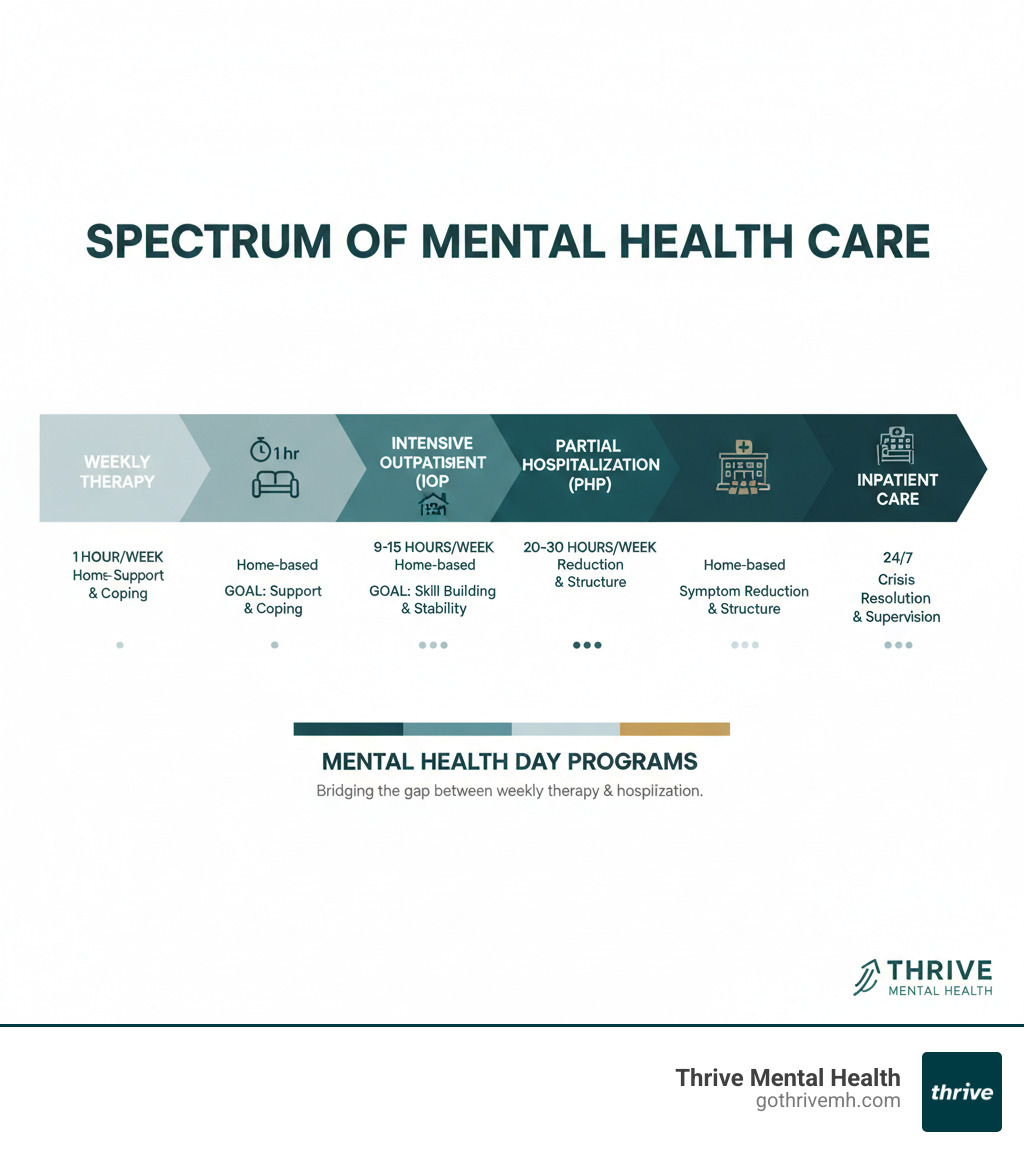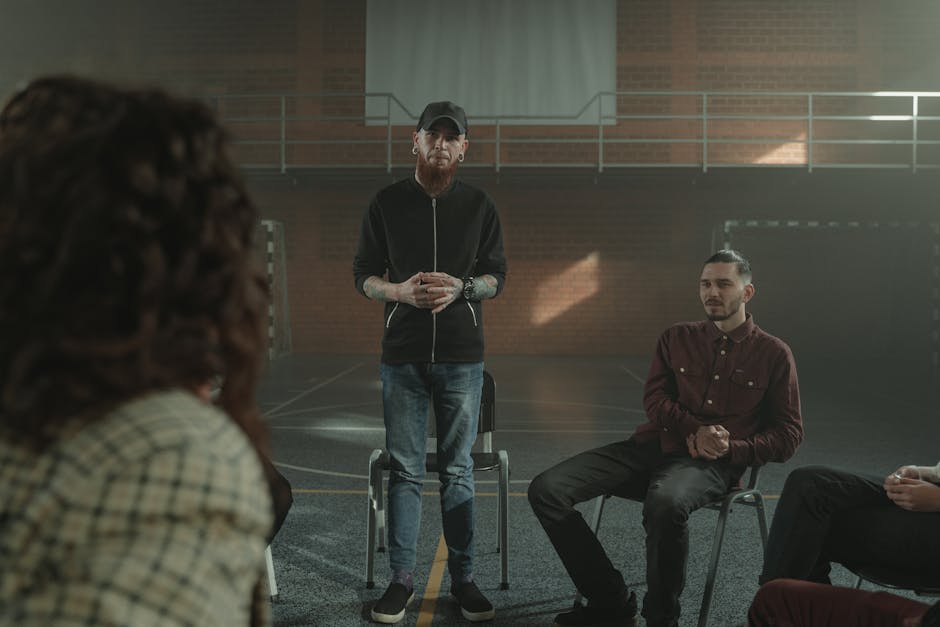Beyond the Couch: Exploring Intensive Day and Outpatient Mental Health Programs

Mental Health Day Program [2025]: Stabilize in 4–6 Weeks—Avoid Hospitalization, Use Your Insurance
If you’re in crisis or having thoughts of self-harm, call or text 988 right now. You are not alone.
A mental health day program is a structured, intensive treatment option providing daily therapeutic support for individuals with acute mental health symptoms, without requiring overnight hospitalization. These programs fill the critical gap between weekly therapy that isn’t enough and inpatient care that feels too disruptive.
What you need to know about mental health day programs:
- Two main types: Partial Hospitalization Programs (PHP) offer full-day treatment (5-6 hours), while Intensive Outpatient Programs (IOP) provide part-day sessions (3 hours).
- Duration: Most programs run 4-6 weeks, though some may extend to 12 weeks.
- Who they’re for: Adults experiencing depression, anxiety, PTSD, bipolar disorder, or substance use issues who need more than weekly therapy but don’t require 24-hour inpatient care.
- Treatment approach: Evidence-based therapies like CBT and DBT, combined with peer support and medication management.
- Availability: Offered in-person and virtually, with some programs offering evening options for working professionals.
These programs offer the clinical intensity you need while allowing you to return home each day. You can practice new coping skills in real-world situations, connect with peers who understand, and build a recovery plan that works with your schedule. As a leading provider of intensive outpatient and partial hospitalization programs in Florida, Thrive Mental Health has seen how this structured approach helps individuals stabilize symptoms, prevent hospitalization, and build lasting recovery skills while maintaining their daily responsibilities.

Simple guide to mental health day program:
What is a Mental Health Day Program and Who is it For?
A mental health day program provides intensive, structured treatment for several hours a day, allowing you to return home each evening. It’s designed to create real change when weekly therapy isn’t enough, but full hospitalization feels too disruptive.
These programs serve several key purposes:
- Crisis Management & Symptom Stabilization: They provide immediate, daily support to help manage overwhelming anxiety, depression, or mood swings before they escalate.
- Alternative to Hospitalization: For those who need intensive care but don’t require 24/7 monitoring, a day program offers a high level of support while allowing you to live at home.
- Step-Down from Inpatient Care: A day program can act as a crucial bridge from the hospital back to daily life, providing continued structure and support to prevent relapse. Learn more about what an IOP offers as a step-down option.
Beyond managing symptoms, these programs focus on building long-term skills, such as recognizing triggers, managing intense emotions, and improving communication.
Who is Eligible for a Day Program?
Mental health day programs are for adults (18+) and young professionals who need more support than weekly therapy but can safely live at home. Eligibility is based on your current level of functioning, not just a specific diagnosis.
Programs typically serve individuals with primary psychiatric conditions, including:
- Major Depressive Disorder
- Generalized Anxiety Disorder
- Bipolar Disorder
- PTSD and trauma-related disorders
- Obsessive-Compulsive Disorder
Many programs also treat concurrent disorders, where mental health and substance use issues are addressed simultaneously. The key requirement is that you are stable enough to participate in a group setting and follow the program schedule.
Signs You Might Benefit from a Mental Health Day Program
If you feel like you’re treading water rather than making progress in your recovery, a day program might be the right next step. Consider a program if:
- Weekly therapy feels insufficient to address the challenges you face between sessions.
- Your symptoms are disrupting daily life, making it hard to work, maintain relationships, or practice self-care.
- You were recently discharged from an inpatient stay and need a structured transition back to your routine.
- You are at risk of hospitalization and want to intervene before a crisis occurs.
- You are seeking structure, peer connection, and expert guidance to build effective coping strategies while maintaining your job and home life.
If you’re in crisis, call/text 988 right now. You are not alone.
Inside the Program: Structure, Services, and Therapies
A mental health day program provides a structured therapeutic environment designed to help you build skills and stability. The daily, intensive format creates a sense of routine and community that is central to the healing process.

Typical Duration and Daily Structure
Most programs run for 4 to 6 weeks, though some may extend to 12 weeks based on clinical needs. The daily schedule depends on the level of care:
- Partial Hospitalization Programs (PHP) are more intensive, requiring 5-6 hours per day, five days a week. This full-day structure is ideal for those needing a high level of support.
- Intensive Outpatient Programs (IOP) offer more flexibility, with sessions running about 3 hours per day, three to five days a week. Many IOPs, including ours at Thrive Mental Health across Florida, offer morning, afternoon, or evening sessions to accommodate work or school schedules.
Both in-person programs at our Florida locations and Virtual Intensive Outpatient Programs are available, delivering the same evidence-based care with added convenience and accessibility.
Services and Therapies Offered in a Mental Health Day Program
Day programs use a comprehensive, multidisciplinary approach. Key services include:
- Group Therapy: The core of the program, offering peer support and a safe space to learn and practice new skills.
- Individual Counseling: One-on-one sessions with a primary therapist to address personal challenges and goals.
- Psychiatric Assessment & Medication Management: Access to a psychiatrist for medication evaluation, adjustments, and monitoring.
- Case Management: Practical support for coordinating care, connecting with community resources, and planning for aftercare.
- Family Education & Therapy: Sessions to help loved ones understand your condition and create a supportive home environment.
- Skills Development Workshops: Practical training in mindfulness, stress reduction, communication, and relapse prevention.
Incorporating Evidence-Based Practices like CBT and DBT
Our programs are built on therapeutic approaches backed by scientific research, primarily Cognitive-Behavioural Therapy (CBT) and Dialectical Behavioural Therapy (DBT).
- Cognitive-Behavioural Therapy (CBT) helps you identify and change negative thought patterns and behaviors that fuel depression, anxiety, and PTSD.
- Dialectical Behavioural Therapy (DBT) is highly effective for managing intense emotions and improving relationships. It focuses on four key skills: mindfulness, distress tolerance, emotion regulation, and interpersonal effectiveness. You can explore scientific research on DBT effectiveness here.
- Mindfulness-Based Stress Reduction (MBSR) is integrated throughout our programs to help you stay present, reduce worry, and cultivate calm.
These are not just theories; they are practical tools you will practice daily with the support of a collaborative team. For more on our therapeutic approaches, visit our Treatment Modalities – Virtual IOP page.
Day Programs vs. Other Levels of Care: Finding the Right Fit
Choosing the right mental health treatment involves understanding the different levels of care available. The goal is always to find the least restrictive level of care that will be effective for your situation.
Mental health care exists on a spectrum. On one end is weekly therapy, and on the other is 24/7 inpatient hospitalization. Mental health day programs, including Partial Hospitalization (PHP) and Intensive Outpatient (IOP), occupy the space in between.
- Inpatient Care is for acute crises, providing 24/7 medical supervision in a hospital to ensure safety and stabilization.
- Partial Hospitalization Programs (PHP) offer hospital-level therapeutic intensity (5-6 hours/day) without the overnight stay.
- Intensive Outpatient Programs (IOP) provide structured therapy for about 3 hours a day, 3-5 days a week, allowing you to maintain work or school commitments. Many programs offer flexible evening sessions.
- Traditional Outpatient Therapy involves weekly or bi-weekly one-hour sessions, ideal for managing stable conditions or maintaining progress.
The key differences are time commitment, clinical intensity, and living situation. Day programs allow you to live at home and apply new skills in your daily life. To better understand the nuances, see our PHP vs IOP comparison.
Here’s how these options stack up:
| Criteria | Inpatient Care | Partial Hospitalization (PHP) | Intensive Outpatient (IOP) | Traditional Outpatient Therapy |
|---|---|---|---|---|
| Time Commitment | 24/7 | 5-6 hours/day, 5 days/week | 3 hours/day, 3-5 days/week | 1 hour/week or bi-weekly |
| Living Situation | Hospital/Residential facility | Live at home | Live at home | Live at home |
| Clinical Intensity | Highest | High | Moderate-High | Low-Moderate |
| Primary Goal | Crisis stabilization, safety | Acute symptom stabilization, skill-building | Symptom management, skill-building, functional improvement | Ongoing support, personal growth |
Recovery is not always linear. Many people move between these levels of care as their needs change, stepping down from inpatient to PHP, then to IOP, and finally to traditional outpatient therapy.
The Benefits and Goals of Attending a Program
Attending a mental health day program is an investment in your well-being that extends into every area of your life. The structured support, skill development, and peer community create a powerful foundation for lasting change, helping you prevent hospitalization and reintegrate into your community with confidence.

Key Outcomes for Participants
While symptom reduction is a primary goal, the benefits go much deeper. Participants typically experience:
- Improved Daily Functioning: You regain the ability to manage work, school, and self-care routines that felt overwhelming.
- Effective Coping Skills: You learn and practice evidence-based techniques (like those from DBT) to handle stress and emotional triggers in real-time.
- Crisis Prevention: You develop a plan to recognize early warning signs and use your new skills to de-escalate a situation before it becomes a crisis.
- Increased Self-Awareness: You gain insight into your thought patterns and emotional triggers, empowering you to make healthier choices.
- A Stronger Support Network: You connect with peers who understand your struggles, reducing feelings of isolation and building a community that supports recovery.
- Greater Self-Reliance: You become your own advocate, equipped with the tools and confidence to manage your mental health long-term.
Research shows that virtual intensive outpatient programs can deliver these outcomes with the added benefits of flexibility and accessibility.
The Role of the Multidisciplinary Team
The effectiveness of a mental health day program comes from its collaborative team of specialists who coordinate your care. This ensures your treatment plan is holistic and individualized.
Your team may include:
- Psychiatrists who manage medication and provide medical expertise.
- Nurses who monitor your physical and mental well-being.
- Social Workers who provide therapy and connect you to community resources.
- Occupational Therapists who help you rebuild daily routines and life skills.
- Peer Support Specialists who offer hope and guidance from their own lived experience with recovery.
This collaborative model means your entire team is on the same page, working together to support your progress. At Thrive Mental Health, our intensive outpatient and partial hospitalization programs in Florida are built around this effective, team-based approach.
How to Access a Program: Referrals, Cost, and Insurance
Accessing a mental health day program is more straightforward than you might think. We can help you steer the process, from the initial referral to understanding your insurance coverage.

The Referral and Admission Process
There are several ways to get started:
- Professional Referral: Your doctor, therapist, or psychiatrist can refer you to a program.
- Self-Referral: You can contact us directly without a referral. Call us at 561-203-6085 or start your benefits check online to begin.
- Hospital Discharge: If you are leaving an inpatient unit, a social worker will often coordinate your referral to a day program as a “step-down” in care.
Once you connect with us, we’ll conduct a compassionate clinical assessment to ensure our program is the right fit and to customize your treatment plan. The process from first contact to starting treatment can often happen within a few days. If you’re searching for an Adult Intensive Outpatient Mental Health Program in Florida, we can help you explore your options quickly.
Understanding the Cost and Funding of a Mental Health Day Program
Cost should not be a barrier to getting help. Most mental health day programs are covered by insurance.
- Insurance Coverage: PHP and IOP are standard benefits under most commercial insurance plans. We work with major providers like Cigna, Optum, and Florida Blue, and we also accept Florida Medicaid.
- Verify Your Benefits: Our admissions team can provide a no-obligation benefits check to clarify your coverage, deductible, and any out-of-pocket costs. You can start your benefits check online or call us for assistance.
- Mental Health Parity in Florida: Florida law requires insurers to cover mental health care at the same level as physical health care, expanding access to these programs.
- Private Pay: If you don’t have or prefer not to use insurance, we offer flexible private pay options.
The Importance of Family and Caregiver Involvement
Recovery is more successful when your loved ones are involved. Our mental health day programs incorporate family and caregivers through:
- Family Education: Helping your support system understand your condition and the treatment process.
- Improved Communication: Offering therapy and guided discussions to heal relationships and build healthier communication patterns.
- Supportive Home Environment: Giving family members the tools to create a home environment that reinforces your recovery.
- Transition Planning: Collaborating on an aftercare plan to ensure you have a strong support network after completing the program.
Frequently Asked Questions about Mental Health Day Programs
It’s natural to have questions when considering a new level of care. Here are answers to common queries about a mental health day program.
How long is a typical mental health day program?
Most programs, including both Partial Hospitalization (PHP) and Intensive Outpatient (IOP), last between 4 to 6 weeks. Some IOPs may extend to 9-12 weeks based on your needs.
Can I work or go to school while in a day program?
Yes—especially in an IOP. IOPs are about 3 hours/day, 3-5 days/week with morning, afternoon, or evening options. PHP is 5-6 hours/day and is harder to combine with full-time work.
Are virtual day programs as effective as in-person ones?
Yes. Virtual IOPs deliver the same evidence-based care and outcomes for many participants, with added convenience and accessibility.
How much does a mental health day program cost with insurance?
Most commercial plans cover PHP/IOP. Your out-of-pocket costs depend on your deductible and co-insurance. We work with Cigna, Optum, and Florida Blue. Check your coverage in 2 minutes (no obligation) here: Start benefits check.
What does a typical day look like in a day program?
- PHP: 5–6 hours/day of skills groups (CBT/DBT), individual therapy, medication check-ins, and planning.
- IOP: 3 hours/day focused on skills practice, process groups, and weekly individual sessions. You’ll leave with concrete homework to apply at home or work.
Suggested FAQ schema (JSON-LD):
Take the Next Step Toward Healing
Ready for support in Florida? Thrive offers virtual and hybrid IOP/PHP with evening options. Verify your insurance in 2 minutes (no obligation) → Start benefits check or call 561-203-6085. If you’re in crisis, call/text 988.
If you’re in crisis right now, please call or text 988. Help is available 24/7.